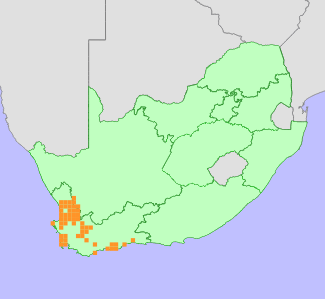| Scientific Name | Helichrysum moeserianum Thell. | Higher Classification | Dicotyledons | Family | ASTERACEAE | Synonyms | Helichrysum rutilans of other authors, not of (L.) D.Don (misapplied name) | Common Names | 'khoi'-kooigoed (a), Kooigoed (a) |
National Status | Status and Criteria | Least Concern | Assessment Date | 2020/11/24 | Assessor(s) | W. Foden & L. Potter | Justification | Helichrysum moeserianum is widespread, very common and not declining. It is listed as Least Concern. |
Distribution | Endemism | South African endemic | Provincial distribution | Northern Cape, Western Cape | Range | This species is endemic to South Africa, and is found from Vanrhynsdorp to the Cape Peninsula and eastwards to Mossel Bay. |
Habitat and Ecology | Major system | Terrestrial | Major habitats | Cederberg Sandstone Fynbos, Graafwater Sandstone Fynbos, Olifants Sandstone Fynbos, Leipoldtville Sand Fynbos, Atlantis Sand Fynbos, Nardouw Sandstone Fynbos, Bokkeveld Sandstone Fynbos, Swartruggens Quartzite Fynbos, Canca Limestone Fynbos, Albertinia Sand Fynbos, Eastern Ruens Shale Renosterveld, Mossel Bay Shale Renosterveld, Citrusdal Shale Renosterveld, Swartland Shale Renosterveld, Agter-Sederberg Shrubland, Hartenbos Dune Thicket, Doringrivier Quartzite Karoo, Cape Flats Dune Strandveld, Breede Alluvium Fynbos, Namaqualand Strandveld, Vanrhynsdorp Gannabosveld, Citrusdal Vygieveld, Klawer Sandy Shrubland, Matjiesfontein Shale Renosterveld, Kouebokkeveld Alluvium Fynbos, North Langeberg Sandstone Fynbos, Tanqua Wash Riviere, Breede Shale Fynbos, Peninsula Granite Fynbos, Swellendam Silcrete Fynbos, Cape Flats Sand Fynbos, Northern Inland Shale Band Vegetation, Swartland Granite Renosterveld, Hopefield Sand Fynbos, Central Coastal Shale Band Vegetation, Robertson Granite Fynbos, Nieuwoudtville Shale Renosterveld, Swartruggens Quartzite Karoo, Kobee Succulent Shrubland, Piketberg Quartz Succulent Shrubland, Blombos Strandveld, Overberg Dune Strandveld, Langebaan Dune Strandveld, Saldanha Limestone Strandveld, Saldanha Flats Strandveld, Swartland Silcrete Renosterveld, Lambert's Bay Strandveld, Winterhoek Sandstone Fynbos, Central Ruens Shale Renosterveld, Vanrhynsdorp Shale Renosterveld, Robertson Granite Renosterveld, Tanqua Karoo, Ruens Silcrete Renosterveld, Goukamma Dune Thicket, Breede Alluvium Renosterveld, Peninsula Sandstone Fynbos, Saldanha Granite Strandveld | Description | It occurs in fynbos, renosterveld and succulent karoo shrubland, on sandy mountain slopes and flats. |
Threats | | Threats to Helichrysum moeserianum include habitat degradation, harvesting and invasive alien species. |
Population | There is no information available on the population of this species.
| Population trend | Stable |
Assessment History |
Taxon assessed |
Status and Criteria |
Citation/Red List version | | Helichrysum moeserianum Thell. | Least Concern | Raimondo et al. (2009) | |
Bibliography | Goldblatt, P. and Manning, J.C. 2000. Cape Plants: A conspectus of the Cape Flora of South Africa. Strelitzia 9. National Botanical Institute, Cape Town.
Hilliard, O.M. 1983. Gnaphaliinae (First Part). In: O.A. Leistner (ed). Flora of Southern Africa 33 Asteraceae, Part 7 Inuleae, Fascicle 2:1-325. National Botanical Institute, Pretoria.
Raimondo, D., von Staden, L., Foden, W., Victor, J.E., Helme, N.A., Turner, R.C., Kamundi, D.A. and Manyama, P.A. 2009. Red List of South African Plants. Strelitzia 25. South African National Biodiversity Institute, Pretoria.
|
Citation | | Foden, W. & Potter, L. 2020. Helichrysum moeserianum Thell. National Assessment: Red List of South African Plants version 2024.1. Accessed on 2025/12/10 |
 Comment on this assessment Comment on this assessment
|
Search for images of Helichrysum moeserianum on iNaturalist
|
 Comment on this assessment
Comment on this assessment

